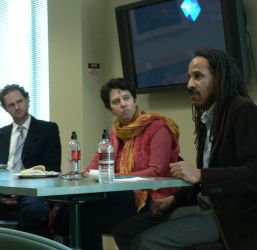On the Historical Record

(l.to r.) Jesse Shipley, Vicky Funari and Louis Massiah.
Details
How does filmmaking intersect with social activism? What are some of the ways documentaries can revise the historical record?
Those were just a few of the questions explored by a panel of documentary filmmakers that convened in Stokes Hall in December for a discussion and screening.
“For me, documentary filmmaking is connected with politics and with civilization and civilizing,” filmmaker Louis Massiah (Power!, The Bombing of Osage Avenue) told the lunchtime crowd, delivering what amounted to a manifesto. “It's tied to making the society more humane. Historiography is moral work. That is the documentary field I am grounded in and believe in.”
Massiah, founder and executive director of Philadelphia's Scribe Video Center, and a visiting assistant professor in Haverford's Independent College Programs, was joined on the panel by two other equally impassioned filmmakers. The event, titled“Making Films: Constructing Histories,” also featured Haverford College assistant professor of anthropology Jesse Shipley (Living the Hiplife) and Vicky Funari (Maquilapolis; Live Nude Girls! Unite). Each screened excerpts from their documentaries and reflected on the perspectives they bring to their work.
Funari, a visiting instructor in Haverford's Independent College Programs, said about her work as a documentarian concerned with marginalized women:“I'm trying to dismantle one history as I construct another. As you do that, you also have to dismantle the viewer's own engagement with the official story.”
Funari showed clips featuring an array of disparate techniques. From Maquilapolis, which got a screening on campus in November sponsored by the Gender and Sexuality Studies Program, Funari showed scenes with arresting stop-action photography as well as rough video diary footage shot by one of the Tijuana factory workers whose story is told in the documentary. Excerpts from Paulina, about a Mexico City domestic worker, featured darkly comic dramatic reenactments.
“If the work is dealing with hybrid identities, it has to take a hybrid form,” said Funari, who revealed that her decision to use actors to recreate some scenes from her subject's life put the film's status as a documentary into question when she submitted Paulina to film festivals.“Some people said this isn't a documentary,” said Funari.“But it's really important to me that my films don't follow a certain pattern. It's a political statement for me. I think you can do anything you want in a film as long as you are ethical in what you're doing.”
Jesse Shipley showed excerpts from Living the Hiplife, which combines interviews with musicologists, historians and the Ghanian hiphop star who inspired the film, as well as archival footage from Ghana's Colonial past and early days of independence.“We're using the politics to talk about the music and the music to talk about the politics,” said Shipley, whose film looks at issues of the African diaspora and the global spread of hip hop music.
“The question for me is, How do you tell contested history?” Shipley said.“In a documentary it may seem like someone is telling history directly, but sometimes it really is about obfuscating.”
As part of his presentation, Massiah screened an excerpt from one of the videos produced by Scribe Video Center's Precious Places project. Launched in 2005, the project provides equipment and technical assistance to groups interested in documenting their community's history. In the clip Massiah showed, a Camden, New Jersey, group performs a purification ceremony in a historic house whose original identity as a slave plantation had been long obscured. In the powerful climax to the short film, the group reads aloud the names of the slaves who once lived there.
Associate professor of anthropology Maris Gillette, who organized the panel with the help of the Center for Peace and Global Citizenship's Faculty/Curricular Support Fund, said the event was part of Haverford's ongoing effort to build its offerings in visual studies.
“This has been a response to student interest, and also to expectations for visual literacy demanded by contemporary society,” said Gillette, who employs film in her own scholarly work documenting the transition to capitalism of the centuries-old porcelain industry in China. “Documentary film is an extraordinarily effective vehicle for communicating the experiential and affective dimensions of social and cultural worlds and I want our students to be able to have skills in filmmaking and visual analysis as part of their intellectual repertoire.”
--Eils Lotozo



